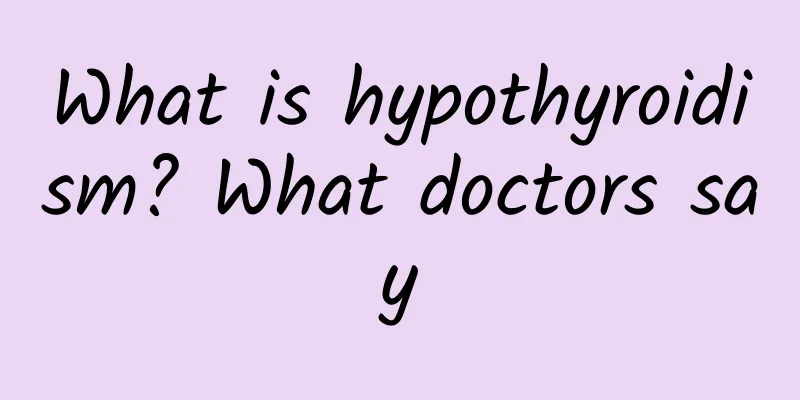What is hypothyroidism? What doctors say

|
Hypothyroidism, also known as hypothyroidism, is a common endocrine disease. It is mainly caused by a decrease in the synthesis and secretion of thyroid hormones, or insufficient physiological effects, which leads to reduced metabolism of the body. Hypothyroidism can affect the normal functions of various systems in the body, including the nervous system, cardiovascular system, digestive system, muscle and skeletal system, etc. 1. What is the cause of hypothyroidism? 1. Hypothyroidism caused by thyroid disease: Thyroid surgery, radioactive iodine treatment, etc. These factors may cause damage or destruction of the thyroid gland, thus causing hypothyroidism. Hashimoto's thyroiditis, subacute thyroiditis, etc. These diseases interfere with the synthesis and secretion of thyroid hormones, leading to a decrease in thyroid hormone levels in the body. 2. Pituitary or hypothalamic lesions: such as pituitary tumors, hypothalamic damage, etc. These lesions can affect the pituitary gland's control over the thyroid gland, leading to decreased secretion of thyroid hormones. 3. Thyroid hormone resistance syndrome: This condition is caused by problems in the mechanism of action of thyroid hormone in the body, leading to thyroid hormone resistance and thus causing hypothyroidism. 2. What are the symptoms of hypothyroidism? 1. Systemic manifestations: fatigue, slow movement, reduced work ability, fear of cold, etc. 2. Skin symptoms: dry and rough skin, etc. 3. Nervous system symptoms: drowsiness, forgetfulness, suspicion, depression, etc. 4. Symptoms of the cardiovascular system: bradycardia, heart failure, pericardial effusion, cardiac enlargement, etc. 5. Digestive system: symptoms such as loss of appetite, constipation, abdominal distension, etc. 3. How to treat hypothyroidism? The treatment of hypothyroidism is mainly to correct the hypothyroid state by supplementing thyroid hormone. Commonly used drugs include levothyroxine (L-T4) and thyroxine tablets (T3/T4 mixture). The treatment dose needs to be determined according to the patient's condition and laboratory test results. Generally, it is necessary to take it for a long time and adjust the dose regularly. At the same time, the doctor will also give other treatment measures according to the patient's specific situation, such as treatment for the cause, symptomatic treatment, etc. In terms of drug treatment, levothyroxine (L-T4) is the most commonly used drug for the treatment of hypothyroidism. It is a type of thyroid hormone naturally secreted by the human body, and can correct the symptoms of hypothyroidism by replenishing the insufficient thyroid hormone in the body. The doctor will determine the dosage that the patient needs to take based on the patient's condition and laboratory test results. Generally speaking, the initial dose will be relatively low, and then the dose will be gradually adjusted based on the patient's response and regular laboratory test results. In addition to levothyroxine, thyroxine tablets (T3/T4 mixture) can also be used to treat hypothyroidism. This drug contains thyroxine (T4) and triiodothyronine (T3), which can supplement T3 and T4 at the same time, thereby correcting the symptoms of hypothyroidism. However, due to the relatively large side effects of this drug, it is not as commonly used as levothyroxine in the treatment of hypothyroidism. 4. How to prevent hypothyroidism? 1. Maintain a healthy lifestyle: eat a healthy diet, exercise moderately, maintain a good work and rest schedule, etc. Avoid overwork and excessive mental stress: reduce work pressure, balance your life, learn stress coping skills, etc. 2. Avoid long-term use of certain medications: Before using any medication, you should consult a doctor or pharmacist to understand its effects on thyroid function; for some medications that may affect thyroid function, such as antidepressants, antiallergic drugs, etc., thyroid function tests should be performed regularly and medication should be adjusted as prescribed by the doctor. 3. Actively treat autoimmune diseases: such as diabetes, chronic kidney disease, etc. These diseases may affect thyroid function and lead to hypothyroidism. 4. Avoid exposure to radioactive substances and chemicals: These substances may damage thyroid tissue and cause hypothyroidism. Author: Wang Ying, Wen'an County Hospital, Langfang City |
Recommend
What brand is 943 eye cream? What age group is 943 eye cream suitable for?
943 eye cream is a very popular brand recently. T...
What should I do if my baby doesn't move during fetal anomaly screening?
Nowadays, the most common tests during prenatal e...
What are the dangers of having sex with a condom during menstruation?
During the menstrual period, women's body'...
What are the causes of sandstorms and what are the hazards of sandstorms?
The period between spring and winter is the peak ...
Can I drink black coffee to lose weight during my period?
Maybe many women know that menstruation is the go...
Please check! 2021 New Year's Day and Spring Festival Health Tips
The Spring Festival is the most important traditi...
Is hyaluronic acid good for removing crow's feet?
Beauty salons are very popular nowadays, and ever...
What is papilloma?
Papilloma may appear on human skin and in many or...
How to treat fungi and fungi
Getting sick is inevitable, because if you are no...
How to regulate before pregnancy?
The early stage of pregnancy is also very importa...
Milk tea machine review | No way, no way, there are still people who don’t know about milk tea machines
No way, no way, there won't be anyone who doe...
Please check these popular science knowledge about diabetes
With the improvement of the overall living standa...
How many days can a pregnant woman breathe oxygen once?
Pregnant women with anemia, poor lung function te...
Revealed: Ten secrets of women's menstrual period
Menstruation is both familiar and unfamiliar to w...









